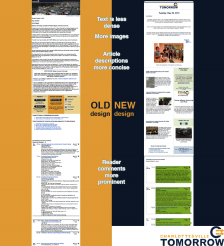Charlottesville Tomorrow turns reader feedback into action

Charlottesville Tomorrow can count many successes under its belt. It has a content partnership with the daily local. Every two years, it produces and delivers voting guides to every Charlottesville address. Home to Cvillepedia, Charlottesville Tomorrow works with its community to make the wiki the go-to for neighborly knowledge and history.
As possibilities continued to mount, the team of two full-timers—with additional support from part-time (paid) interns—decided it was time for a community engagement anchor. The Charlottesville Area Community Foundation agreed, and in partnership with the Knight Foundation, they jointly awarded Charlottesville Tomorrow a $104,000 grant in 2011.
New to the role and the area, Community Engagement Coordinator Jennifer Marley immediately solicited input from Charlottesville Tomorrow readers in the form of surveys, asking its 2,700 email subscribers how they engage with Charlottesville Tomorrow. An average of 15% responded, and Charlottesville began to fill in the gaps on how readers get their content.
"Community engagement can be a squishy thing to track, and one of the things that I have been really focused on in my time here is coming up with ways that are indisputable evidence of progress-or-not," Marley said.
Marley's first survey went out in October 2011, and a second followed in May 2012. The second survey repeated a few questions from the original—how readers get their Charlottesville Tomorrow news, whether they are subscribed to Charlottesville Tomorrow's Facebook and Twitter feeds, if readers attend events—but couched in slightly different language. Since Charlottesville Tomorrow is home to some powerful tools, Marley saw it fit to ask about only a few of those resources at a time. The first survey highlighted Cvillepedia while the second explored the navigability of the Charlottesville Tomorrow site.
"One of the questions I asked in the first survey is how are you receiving your news from us … The second survey, I wanted to probe a little deeper and pull a little bit of flavor from those results. I did it by asking 'how have we impacted your life?'" Marley said. "It takes it a step further beyond just 'how are you interacting with us and reading us' and asks 'how are we impacting your life and what other kinds of flavors are coming out of our presence in your life.'"
Till the survey results came in, Marley had her own thoughts on how easy it was to find and navigate the Charlottesville Tomorrow site, but no numbers to back it up. "Having those survey results really gave us the right kind of ammunition that we needed," Marley said, and Charlottesville Tomorrow will be relaunching the site on the Armstrong CMS later this summer.
The survey told Charlottesville Tomorrow what it was doing right: 22% said keep up executive director Brian Wheeler’s visible presence in the community, most of all at events. And although the survey was an act of community engagement, responses on the biannual voting guides spotlighted another area for improvement.
"A lot of people didn't even know that they'd received it or didn't know that it was from us. To me, that's going to impact the way that we brand and talk about that particular tool the next time our local elections roll around. That seems to me to beyond the scope of community engagement and more of a way that we're talking about ourselves."
In small organizations, each staffer wears many hats. And in recent years as the startup and journalism worlds sidle up next to each other, journalists are gleaning many practices from their tech counterparts, such as iteration and user behavior. Charlottesville Tomorrow is no exception. Although each survey solicited the same pool of newsletter subscribers, Charlottesville Tomorrow did not have resources to follow a control group and learn how respondents’ answers change over time. Marley, though, was not going to let that stop Charlottesville Tomorrow from asking for and acting on feedback.
Despite the actionable feedback that Charlottesville Tomorrow is getting, Marley believes it would be smart to limit surveys to twice a year. Having embedded herself into the Charlottesville scene, she has also cultivated a sensitivity for the rhythm and character of the community.
"It's like that gut feeling you get when you think, oh maybe I shouldn't stop by my neighbor's house again tonight; they've probably seen enough of me this week and I want to maintain a relationship with them,” Marley said. “I just want our readers to get used to talking with us in this way, sharing their opinions with us in this way."




